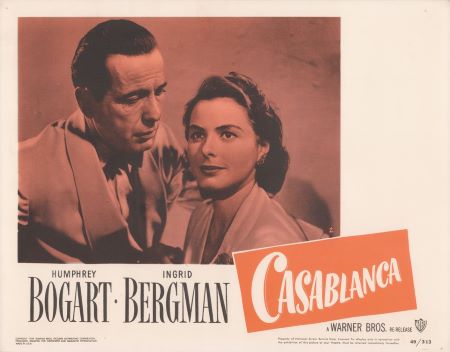
Getting a movie title right is of growing importance as the entertainment landscape gets cluttered by mushrooming digital media, says a Variety story by Rebecca Rubin.
When research screenings audiences didn’t warm to “Something’s Wrong With Rose,” the Variety story says, Paramount Pictures renamed its 2022 horror film “Smile.” The scare flick went on to generate $107 in domestic boxoffice (United States and Canada) and $217 worldwide. Not bad for the R-rated film that cost just $17 million to make. The simpler and on-the-surface innocuous title “Smile” was cloaked with sinister inferences in studio marketing.
Among famous switcheroos in movie history: the beloved 1942 Bogart classic “Casablanca” was originally “Everybody Comes to Rick’s” and 1990 romantic-comedy “Pretty Woman” was “3,000” (the amount of dollars for a week of the woman’s services). Acclaimed 1968 cult horror film “Night of the Living Dead” was a last-minute replacement for “Night of the Flesh Eaters,” and the title change messed up the movie’s copyright registration.
Oscar Best Picture winner “Everything Everywhere All at Once” is a mouthful in an era where one or two word titles are favored. “But the creators held firm, believing the unwieldy moniker captured the unwieldy energy of the film, which eventually earned a remarkable $100 million at the box office and dominated the Oscars,” writes Rubin in Variety.
For sequels, there’s usually a few words bolted on the original title, like “Avatar: The Way of Water.” The bolt-on provides some separation from others in the same film series. The original 1977 “Star Wars” is now known as “Star Wars: Episode IV — A New Hope”; the postscript provides differentiation from the other 11 “Star Wars” theatricals in the series.

The title selection impacts how quickly consumers can correctly identify its genre, online search where confusion might occur with similarly named phrases and how the movie lives forever post-theatrical in movie directories.
Selecting movie titles is also object of prerelease consumer research to see how names resonate with moviegoers. Research testing determines if a title positions a firm correctly or not, if it creates confusion and if it engenders good feelings. The title ought to be finalized before a film starts production because otherwise the trickle of publicity that starts when films are in preproduction will be wasted on what becomes a discarded working title.
Hollywood does have a movie title clearinghouse so film distributors don’t fall over each other with identical titles. “The major studios’ trade group — the Motion Picture Association (MPA) — operates Title Registry Bureau, which is an industry clearinghouse used by non-MPA companies as well,” says the third edition of academic/business book “Marketing to Moviegoers.” Industry companies that “participate must abide by rules that include arbitration to resolve disputes. Usually, a film company has done a full copyright search before attempting to register a name with the bureau.”
By the way, movie titles cannot be copyrighted though presentation can be protected from willful attempts to confuse consumers. Elements like title typeface and color presentation have a degree of proprietary, and infringers risk being slapped down in litigation.
“Independents stretch the most at serving up catchy titles,” notes “Marketing to Moviegoers.” “These include Miramax-distributed ‘Sex, Lies, and Videotape,’ Lionsgate-distributed ‘Kick-Ass’ and ‘House of 1,000 Corpses,’ Nu Image’s ‘Diary of a Sex Addict,’ and Vestron/ Lionsgate’s ‘Dirty Dancing,’ which actually wasn’t all that risqué.”
Title selection has marketing implications and has limits. “In the online world,” Rubin writes in Variety, “a catchy name has potential to propel a film into the zeitgeist (see ‘M3GAN’), just as a clunky one can send a film plunging into obscurity faster than you can say ‘Birds of Prey and the Fantabulous Emancipation of One Harley Quinn.’”
Related content:
Leave a Reply